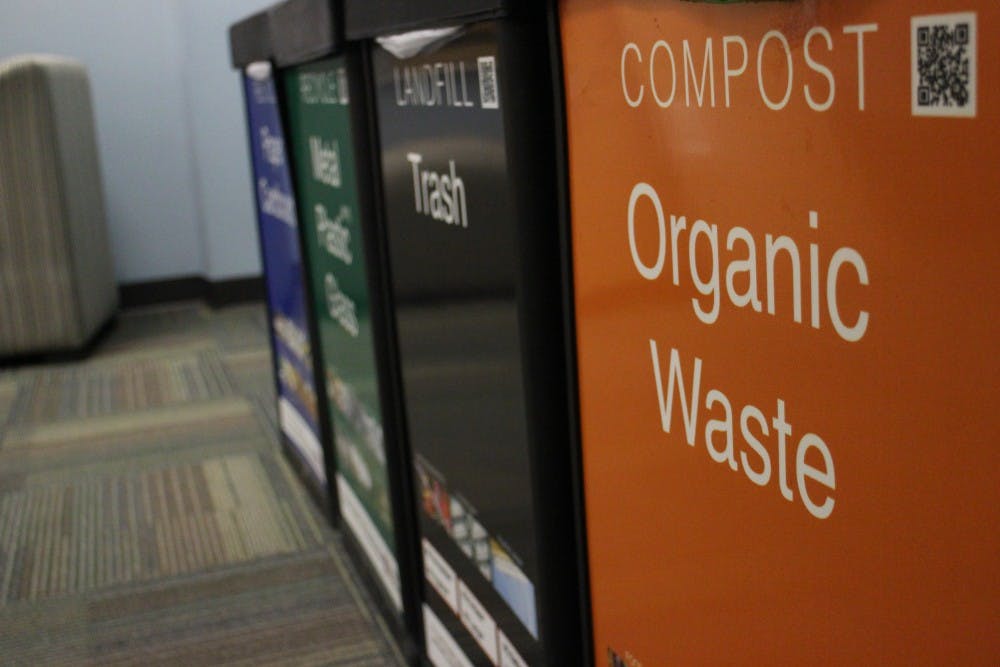After a summer of work, the student-led Zero Waste Club and Zero Waste coordinators in the facilities management department have launched a new compost program aimed at making composting easier for students.
Grace Pugh, co-president of the club, said AU had previously lost its composting contract in November 2014 due to high contamination levels, especially in residence halls. This means too many non-compostable items were thrown into the compost bins.
The University renewed its contract with the Prince George’s County composting facility in Maryland in February 2016 on the condition that AU’s waste be perfectly sorted. Since then, Zero Waste Club leaders have worked with Tyler Orton, Zero Waste facilities manager, to make the compost process more approachable for students.
“We developed a program where compost could be accessible and convenient for students because convenience is so essential to proper waste management,” Pugh said. “If it's convenient for someone to sort waste properly, they most likely will.”
The Zero Waste Club gave out free individual compost bins for the residence halls at the start of the fall 2017 semester, which included a brochure on best composting practices. Zero Waste has placed one large compost bin in each residence hall, separated from the regular trash areas.
“People who are likely to be using the bin are those who know about the program, and if we keep our contamination levels low, we will be able to put more bins in the residence halls,” Pugh said. “It’s kind of baby steps right now but people seem to be really receptive to the program.”
The Zero Waste Club plans to expand the program by giving out more personal bins and eventually adding larger bins once awareness and education about the program spreads. Students can request a bin through the group’s Facebook page or via email.
In addition, Zero Waste Club is going to provide storage for the personal bins over the summer, and those who already had bins will have priority in picking them up at the start of the year. Those students who live off campus have the option to take bins with them as long as they bring the compost back to campus.
“We want for the compost bins to travel with people as they're going through life at AU,” Pugh said.
Plans to change to single-stream recycling in 2018
In addition to launching a new composting program this semester, more changes are on the horizon for the University’s sustainability efforts. AU will transition to single-stream recycling in January 2018, meaning all recyclable materials will be collected in one bin.
Orton said that in the past, AU has had two recycling streams, one being paper and cardboard, and the other being metal, plastic and glass.
“Now those are all combined into one waste stream,” Orton said. “Instead of four bins grouped together around campus, there will be only three.”
D.C. itself will make this change effective Jan. 1. The new program will bring about a new list of recyclable items, moving the District forward in its goal of diverting 80 percent of its waste by 2030.
AU’s Zero Waste department has been working to get new panels put inside the waste bins around campus in preparation for the switch. He said it will take a month to six weeks to change out all of the panels.
“There are 1,100 sets of bins on campus, so we have 4,000 new panels,” Orton said. “It’ll take a long time to make our way all across campus.”
Instead of having the two separate bins, now there will be one bin with one graphic for paper, cardboard, metal, plastic and glass. Pictures on the panel will demonstrate what can be recycled and placed into the new bin.
Recyclable items are typically ones that are large enough to hold other things, Orton said. Small items, like cutlery or straws, can usually be thrown into landfill.
“This helps the efficiency of the program by a lot, and it'll make it easier to communicate recycling to people,” Orton said.
aveitch@theeagleonline.com and kcataudella@theeagleonline.com





